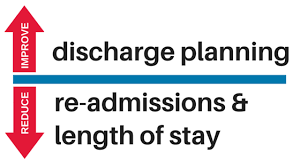One of the biggest challenges faced by home care leaders this year has been gaining access to referrals from hospital discharge planners. Most hospitals have closed off access to discharge planners for a variety of reasons, causing frustration for sales reps and agency leaders. New requirements for hospital discharge planning will require all hospitals to make major revisions to their discharge planning processes. This will prove challenges for many discharge planning departments as they are already over worked, under paid, and seldom appreciated.
These changes, however, may create new opportunities for home health, hospice, and private duty home care companies to offer services to make the job easier for busy, stressed out discharge planning departments. If you can offer a service that makes their job easier, saves them time, and reduces their stress you may be able to win new friends and gain new referrals.
Our long time friend and colleague, Elizabeth Hogue, is staying on top of all of the recent changes from CMS and filed this report. For further information about this issue and other elements of the hospital Conditions of Participation (COPs), feel free to reach out to Elizabeth.
Part 1: CMS Proposes Major Changes in Discharge Planning for Hospitals
By Elizabeth Hogue
On November 3, 2015, the Centers for Medicare and Medicaid Services (CMS) published proposed regulations governing discharge planning by hospitals in the Federal Register. If finalized, these proposed regulations will require hospitals to devote considerably more time and resources to discharge planning activities. Comments to these proposed regulations are due sixty (60) days from the date of publication in the Federal Register.
Proposed changes in Conditions of Participation (CoPs) for hospitals generally require:
– Development and implementation of an effective discharge planning process that focuses on patients’ goals and preferences and prepares patients and their caregivers/support person(s) to be active partners in post-discharge care
– Planning for care that is consistent with patients’ goals for care and treatment preferences
– Effective transition of patients from hospitals to post-discharge care
– Reduction of factors leading to preventable hospital readmissions
Specifically, policies and procedures of hospitals governing discharge planning activities must be:
– Developed with input from hospitals’ medical staff, nursing leadership and other relevant departments
– Reviewed and approved by governing bodies of hospitals
– Specified in writing
The proposed regulations require the discharge planning process to be applied to:
– All inpatients
– Outpatients receiving observation services
– Outpatients undergoing surgery or other same day procedures for which anesthesia or moderate sedation is used
– Emergency department patients identified in accordance with hospitals’ discharge planning policies and procedures by emergency department practitioners responsible for the care of patients who need a discharge plan
– Any other category of outpatients as recommended by the medical staff and specified in hospitals’ discharge planning policies and procedures approved by hospitals’ governing bodies
This change in application of discharge planning activities alone is very significant in terms of the resources and skills that will be needed to meet new requirements!
Registered nurses, social workers or other qualified personnel according to hospitals’ discharge planning policies must coordinate an evaluation of patients’ discharge needs and development of discharge plans.
If finalized, hospitals will be required to identify the anticipated needs of patients following discharge within twenty-four hours after admission or registration. The discharge planning process must be completed prior to discharge home or transfer to another facility and without unduly delaying patients’ discharge or transfer.
If patients’ stay is less than twenty-four hours, discharge needs for each patient must still be identified and the discharge planning process completed prior to discharge home or transfer to another facility without unnecessarily delaying patients’ discharge or transfer.
As the above indicates, these proposed regulations include major changes for discharge planners/case managers. Now is the time to review these proposed regulations and submit comments, if needed.
© 2015 Elizabeth E. Hogue, Esq. All rights reserved.
Elizabeth E. Hogue, Esq.
Office: (877) 871-4062
Fax: (877) 871-9739
Twitter: @HogueHomecare
ElizabethHogue@ElizabethHogue.net
No portion of this material may be reproduced in any form without the advance written permission of the author. Reprinted with Permission




